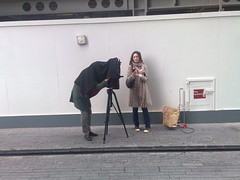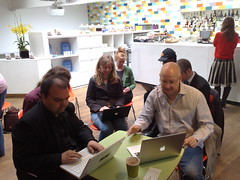 So part II of my academic week wasn’t even planned at the beginning of the week. After my panel contribution at Wealth Of Networks II, I was having a conversation with Marina Jirotka of Oxford Univerisity, who said they had another conference on Thursday entitled ‘Innovative Media For the Digital Economy‘ and wished she’d known about me earlier so I could’ve been involved… so I did what any conference loving solo bassist would do – moved my teaching around, and cleared space in my diary to be there!
So part II of my academic week wasn’t even planned at the beginning of the week. After my panel contribution at Wealth Of Networks II, I was having a conversation with Marina Jirotka of Oxford Univerisity, who said they had another conference on Thursday entitled ‘Innovative Media For the Digital Economy‘ and wished she’d known about me earlier so I could’ve been involved… so I did what any conference loving solo bassist would do – moved my teaching around, and cleared space in my diary to be there!
Continue reading “A Week in Academia pt 2 – Innovative Media For A Digital Economy”
Three new things to look/listen/learn.
 V .quick post this, just to highlight some fun stuff that’s happened in the last couple of days.
V .quick post this, just to highlight some fun stuff that’s happened in the last couple of days.
Continue reading “Three new things to look/listen/learn.”
New Creative Choices post – Creative Sharing
My latest post over on the recently re-named Creative Choices Creative Thinking blog was inspired by the kind of skill swapping and idea sharing that goes on at the Tuttle Club on Friday mornings.
I’m so inspired every week by the wealth of freely-shared ideas, information, skills and support. It’s a model that I see repeated in so many of my friendships with Creative types, so I wrote about it…. Enjoy – just click the link below:
Social Media thoughts Pt 4 – the podcast!
Last Friday, after the Social Media Cafe, I was interviewed by broadcaster and programme maker Penny Jackson for the Creative Coffee Club podcast. She’s a fantastic interviewer in that she asks the questions that from my site of the mic sound obvious, but are the things that make sense of a lot of the stuff I’ve been writing on here.
We talk a lot about my story, where the energy and motivation comes from to see marketing and promoting what I do as a conversation, as well as my understanding of how social media facilitates that, and allows me to make a living from it…
You can listen to the podcast below:
[clarification – half way through, I describe what I do as being pop music, and at the end I say it isn’t pop music – I’m using the term in two different ways: First time it’s because I’m using pop forms and pop harmony for the most part, and my influences are ‘pop’ songwriters. The second time it’s because in a live setting (the context being opening for Level 42) it doesn’t engage you in the way that a pop ‘song’ does, largely because it’s instrumental, and because the looping process means it doesn’t hit you with the hook in the first 15 seconds like any classic pop song would… I really should’ve chosen a different term 🙂 ]
Does that lot make sense? Was it helpful? Do you want to hire me to come and talk to your band/college/company/record label/etc. about how this stuff works for you? I’m all ears… 🙂
Social Media thoughts Pt 1 – my background and history.
The last couple of months have been a really interesting time for me in terms of getting to experiment with, understand and conceptualise about the world of interactive web tools refered to as ‘Social Media’. Next week is the first London Social Media Cafe Musicians get together (we need a new title!) – so I thought I’d throw in some thoughts on social media and music over the next few days:
It’s not as if the idea is new – I’ve been interacting, networking and building knowledge about what I do as a musician on the web since the late 90s via email discussion lists (I joined The Bottom Line in early ’98, I think), forums (been on talkbass since early 2000, IM and music chatrooms. But two things have changed drastically since then – firstly an understanding, both academically and amongst users, of ‘social networking’ as an enterprise in its own right, and secondly the range of tools and web resources to make it happen.
A lot of what’s happening now was happening in a secondary way ages ago – your profile page on a web forum wasn’t that different, conceptually, from your Myspace page, but no-one thought of it in that way. Very few people sought to build an identity there and promote it as a site to visit to find out what they were into. There was no social capital in directing people to your talkbass.com profile page, for example.
Myspace was one of the first to really go huge with the whole Social Networking thing, and invert it from the web forum thing – they made it possible (in a hideously clunky way) for people to build their own page as a shop front for the world, and then to promote that via the various groups on the site, which all had message boards and discussion sections. The groups and forums on myspace have been a relative failure, for a number of reasons – firstly, the design is horrible, but more importantly, Myspace has always been about branded space: people customising their page to make it say something about them. The hook-up with music and bands was what sent them over the edge – they weren’t the best by any stretch, and are no hopelessly behind the game in every conceivable way, they just have 150 million registered users. That helps!
So I got a myspace page in late 2005, and started to search for people who were listening to people I liked, and add them as friends. I did this with about 3-4000 people, over a period of almost a year, with fairly diminished returns. I sold a few CDs as a result, and the general level of awareness of what I do in the bass community was certainly heightened, but it was a scattershot approach, and crucially, when I finally realised that MySpace worked best as an interactive media, not a broadcast one, I was left with a completely unmanageable, uncategorisable list of people I knew very little about, with no way of grouping them geographically, or by their level of interest (I couldn’t tell who’d added me and who I’d added). So my Myspace page, en masse, is still a pool of hideously underused potential, thanks to the completely rubbish way the site itself makes data available. I did a fairly major purge at one point, deleting a couple of thousand ‘friends’ who weren’t interacting and appeared to have nothing in common with what I was doing, but the numbers are now back up close to 8000…
The other social network I joined before Myspace was Last.fm – a much more focussed site, infinitely better designed, MUCH harder to spam, and built to slowly proliferate music that is considered ‘good’ by the regular users. Thanks to me getting in early on last.fm, my music is heavily tagged and associated with some fairly well-listened artists, so my music crops up on a relatively high number of people’s personal radio stations there.
Fast forward 3 years, and I now have a ‘portfolio’ of social networks, including Myspace, Last.fm, ReverbNation, Facebook and Twitter. I’m still involved in a few discussion forums, but largely, I prefer the friend/contact culture of social networks to the bear-pit/lowest common denominator world of most web forums.
For musicians, the onset of the ‘Social Media Age’ has meant an end to the tyranny of broadcast media, to our potential career and audience being in the hands of record execs, radio and TV programmers and big concert agents. We can build relationships with our audience, talk to them, ask for their help spreading the word about music they love, and also help out the musicians we love. The traffic is now moving in every direction, from us to fans, from fan to fan, from fan to us, and even via facebook from our non-music friends and family, to their friends as they use their connection with ‘real musicians’ as social capital on their facebook profile. The flow of information has been somewhat democratised, and the potential for us is huge.
I’ve been talking about this in universities and colleges for a couple of years now, and in the last few months have had the chance to start to conceptualise about Social Media with curious participants and thinkers from other worlds – from the mainstream media, from business, from hi tech industries, from marketing companies – via the various networks of geeks, primarily the weekly marvels that are the London Social Media Cafe and Creative Coffee Club – but that’s part 2…
